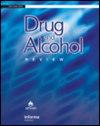‘I Think That Is a Big Step From Here to There’: Exploring the Views of Service Providers About Delivering Drug- and Alcohol-Related Health Services to Aboriginal People in Rural New South Wales
Abstract
Introduction
The higher rates of alcohol and other drug (AOD)-related harms in rural compared to metropolitan areas demonstrate the need for consideration of rural AOD health service delivery. We aim to explore the experiences of health service providers around delivering AOD services to Aboriginal and Torres Strait Islander (hereafter, Aboriginal) people in rural New South Wales (NSW) and opportunities to optimise services.
Methods
Open-ended, semi-structured interviews or written responses were conducted with 18 Aboriginal and non-Aboriginal service providers at Aboriginal community-controlled health services, mainstream services or experts who work with Aboriginal people around AOD in rural NSW. Data were thematically analysed, led by an Aboriginal researcher.
Results
Five themes were identified: (i) the role of family and community; (ii) the role of health services (particularly Aboriginal Community Controlled Health Services) in building cultural connections with clients; (iii) inconsistent referral and communication procedures impact the continuity of care; (iv) difficulties hiring, training and retaining Aboriginal workers; and (v) the role of technology in enhancing service access.
Discussion and Conclusions
Key opportunities to improve the delivery of health service to Aboriginal people in rural NSW include programmes to drive culturally meaningful care, in both Aboriginal and non-Aboriginal services, systemic changes to increase access to AOD training among Aboriginal workers, and better remuneration. Shared clinical records and telehealth may enhance service delivery by increasing service access and referral processes; however, Aboriginal community leadership and cultural safety are crucial for safe design and delivery.

 求助内容:
求助内容: 应助结果提醒方式:
应助结果提醒方式:


